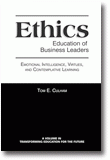
Ethics Education of Business Leaders
Emotional Intelligence, Virtues, and Contemplative Learning
By:
Tom E. Culham, University of British Columbia, Vancouver, Canada
A volume in the series: Transforming Education for the Future. Editor(s): Jing Lin, University of Maryland. Rebecca L. Oxford, University of Maryland. Vachel W. Miller, Appalachian State University. Amanda Jane Fiore, State Department.
Published 2013
Events on Wall Street and Main Street reveal that some business leaders make dramatically unethical self-serving decisions that ignore the public interest. How can business schools educate future business leaders to make ethical decisions? Unfortunately, most business schools fail in teaching ethical decision-making. They erroneously assume that such decision-making is primarily conscious and reason-based, reflecting the western cultural orientation toward science and logic.
In this book, Thomas Culham cites neurological findings showing that unconscious processes and emotions play a much more significant role than reason in making ethical decisions. Culham urges business schools to teach a modified form of emotional intelligence, linked with research-supported contemplative practices from the great meditative traditions. This book details the author's ethics curriculum and explains its successful application at the Sauder School of Business at the University of British Columbia. This fascinating, interdisciplinary, and highly practical curriculum integrates philosophy (virtue ethics), Daoist thinking, psychology, and neuroscience. This curriculum intends to transform the way business schools teach decision making. Such an effort might just transform the way we do business.
CONTENTS
Abstract. Acknowledgments. 1. Background, Context, Overview, and Guiding Philosophy. 2. Emotional Intelligence Meets Virtue Ethics: Implications for Educators. 3. Emotional Intelligence as a Component of Business Ethics Pedagogy. 4. Nourishing Life, the Daoist Concept of Virtue. 5. Cultivation of Virtue (dé) According to the Neiye. 6. Cultivation of Virtuous Leaders According to the Huainanzi. 7. Is There a Place for Contemplation and Inner Work in Business Ethics Education? 8. Incorporating the Inner Work of EI and Contemplation in Ethics Education. Glossary. About the Author.
-
Paperback978-1-62396-346-0
Web price: $45.04 (Reg. 52.99)
-
Hardcover978-1-62396-347-7
Web price: $80.74 (Reg. 94.99)
- eBook978-1-62396-348-4

-
 Apocalyptic Leadership in Education
Facing an Unsustainable World from Where We Stand
Apocalyptic Leadership in Education
Facing an Unsustainable World from Where We Stand
-
 Contemplative Pedagogies for Transformative Teaching, Learning, and Being
Contemplative Pedagogies for Transformative Teaching, Learning, and Being
-
 Critical Conversations about Religion
Promises and Pitfalls of a Social Justice Approach to Interfaith Dialogue
Critical Conversations about Religion
Promises and Pitfalls of a Social Justice Approach to Interfaith Dialogue
-
 Fallow Lands of Plenty
Public Schools as Leaders in Rural Food System Relocalization
Fallow Lands of Plenty
Public Schools as Leaders in Rural Food System Relocalization
-
 Hope for the Embattled Language Classroom
Pedagogies for Well-Being and Trauma Healing
Hope for the Embattled Language Classroom
Pedagogies for Well-Being and Trauma Healing
-
 The Wisdom Way of Teaching
Educating for Social Conscience and Inner Awakening in the High School Classroom
The Wisdom Way of Teaching
Educating for Social Conscience and Inner Awakening in the High School Classroom
-
 Toward a Spiritual Research Paradigm
Exploring New Ways of Knowing, Researching and Being
Toward a Spiritual Research Paradigm
Exploring New Ways of Knowing, Researching and Being

